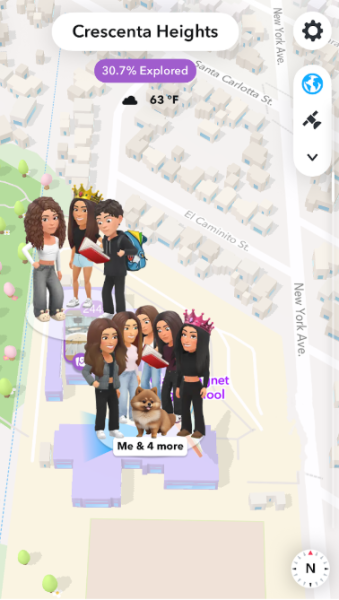School Versus Social Media- a Battleground of Rights
Police officers were lined up Tuesday morning at the front gates of Clark Magnet High School shocking many of the students arriving in the front lot. An email was sent out to students and their families in those early hours with a warning: “Overnight our administration received information about a threat made on social media and reported on the GUSD Tip Line.”
The Clark administration immediately worked with GUSD officials and the Glendale Police Department Tuesday morning to investigate and arrange for additional law enforcement to be on campus that day as an added precaution and to alleviate student, parent, and staff concerns.
Students on campus didn’t seem to think much of the threat and many carried out their day as if it was just a normal Tuesday. Despite minor discussions about the threat, students and teachers deliberated that nothing was going to happen despite the increased police presence on campus.
That afternoon, another email was sent out claiming that “after a thorough investigation, law enforcement has determined that there is no danger to Clark Magnet students or staff and appropriate disciplinary measures have been taken.” To whom these disciplinary actions were given to and what exactly they were remain unknown to students.
Although such an ephemeral threat, this Tuesday’s social media threat reminds many of an ongoing battle between schools and students, a battle of student safety versus student privacy.
On one hand, it is important to monitor what students post on social media for the safety of the school. Threats made against students, teachers, or the school itself would be detected and shut down if surveillance on social media is good enough.
The follow-up email sent by Clark Magnet High School Tuesday afternoon implored parents to “please have a conversation with [their] students about exercising good judgment regarding what they post online and how they share information with each other.” Students also have to consider the digital footprint that they leave behind since it can affect their eligibility for a job or entrance into a college or university.
A school’s observation of social media can be for the betterment of students and for their security as well. This can also extend to help students who are potentially suicidal or a threat to themselves or others at home. If Clark had been actively scouring their student’s social media, perhaps they would have detected the threat on their own before it was reported to them.
On the other hand, such surveillance is violating and invasive. Students do not want to feel monitored constantly by an institution because it limits their self-expression in the fear of getting in trouble. Some may even say it’s a violation of privacy—or even unconstitutional—for schools to moderate what their students are posting or sharing.
There are definitely steps where administrators can overstep their boundaries and delve too deep into the personal lives of students, and especially then should schools and similar institutions should be kept out of the social sphere of teenagers. Additionally, there is no strict regulation for what constitutes an appropriate or inappropriate post, and a student getting in trouble could just be a matter of a disgruntled administrator who doesn’t like what they see.
Whether believed as an infringement of rights or a necessary step to keep students safe, the debate still continues on the extent of schools’ social media management, and all it may take for some people is a peculiar Tuesday morning in order to take a side.











